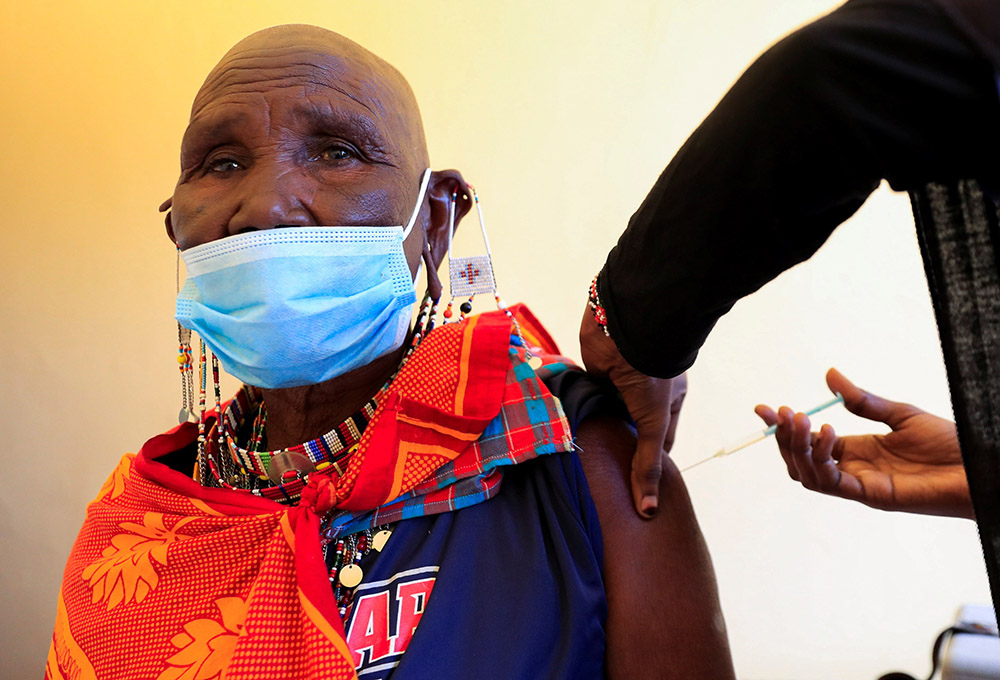
A member of the Indigenous Maasai community receives the COVID-19 vaccine at a health center near Nairobi, Kenya, Aug. 23. (CNS/Reuters/Thomas Mukoya)
Even as Americans have the luxury of considering the possibility of a booster to the coronavirus vaccine, billions of people around the world have yet to have access to even a first jab. As of Sept. 7, only 1.9% of the population in low-income countries had received at least one shot, compared to about 40% worldwide.
In the United States, where 63% of our citizens are at least partially vaccinated, doses of the life-saving preventative medicine are literally being thrown away for lack of use.
We must do better. Vaccinating the world is the key to getting this pandemic under control. And vaccine equity is a moral and ethical issue that Catholics must prioritize.
"A global pandemic is not over until it is over everywhere," said U.S. Rep. Pramila Jayapal of Washington, a co-chair of the new COVID-19 Global Vaccination Caucus, which was launched Sept. 3. "It is not only America's moral responsibility to quickly and equitably unleash the resources necessary to defeat this deadly virus abroad, but doing so will also keep us safe at home."
We applaud the formation of the caucus — to be co-chaired by five Democratic members of the House and Sen. Ed Markey of Massachusetts, a Catholic — to advocate for the manufacture, production and distribution of vaccines in low- and middle-income countries.
Already, the Biden administration has pledged to donate 500 million doses of Pfizer's vaccine — the first 200 million this year and another 300 million over the first half of next year — to COVAX, the initiative co-sponsored by the World Health Organization to distribute vaccines to low- and middle- income countries. The amount was matched by G7 nations, bringing the total to 1 billion doses.
It is not enough.
COVAX estimates that the 2 billion doses it hopes to procure by the end of 2021 will meet only about 20% of the need of poorer countries. Some 11 billion doses (at two doses per person) are needed to vaccinate 70% of the world's population.
As a country and as a church, we must support increased funding for global vaccinations. The Nullifying Opportunities for Variants to Infect and Decimate (NOVID) Act, a detailed blueprint to invest $34 billion in global vaccine manufacturing and distribution to reach herd immunity in all 92 COVAX countries, is a good place to start. Modeled on President George W. Bush's global HIV/AIDS initiative, it is supported by a majority of House Democrats who have called on President Joe Biden to include such funding in any budget reconciliation package.
Advertisement
Both the U.S. Conference of Catholic Bishops and Catholic Relief Services, who praised Biden's vaccine donation pledge in June, have also called for more to be done — especially in strengthening distribution networks.
"U.S. global leadership providing vaccines will only succeed when coupled with a U.S.-led plan to get those vaccines in arms," Bill O'Keefe, CRS' executive vice president for mission, mobilization and advocacy, said in a statement. "National ministries of health and faith-based health providers need more funding and support, especially in conflict areas. Only then will the pandemic end everywhere."
A CRS policy briefing document from April on "Achieving Global Vaccine Equity" listed three challenges to vaccinating low-income countries: high-income countries out-competing low-income ones for vaccine supply; higher levels of vaccine hesitancy; and issues around distribution.
The briefing cited a report that estimated that for every $1 a country or donor government invests in vaccine doses, it needs to invest $5 in delivering the vaccine. This includes storage, delivery and waste management systems, as well as training for health care workers and educational campaigns to build trust through public engagement.
CRS urges the U.S. government to significantly increase its goal of 200 million doses donated this year, to accelerate the distribution timeline and to establish ways to safely and legally reroute vaccines in the U.S. set to expire.
"The U.S. and other wealthy nations must not only deliver on their promises, but demonstrate that purchases of vaccines targeting the unvaccinated here and providing boosters in America are not compromising the global effort," said O'Keefe of CRS.
We agree, and we hope and pray that Biden, a Catholic, listens to Pope Francis, who in last year's Easter message urged "the entire international community, in a spirit of global responsibility, to commit to overcoming delays in the distribution of vaccines and to facilitate their distribution, especially in the poorest countries."
Catholic social teaching emphasizes the principles of human dignity and the preferential option for the poor and vulnerable. Not only will vaccinating the world help prevent new, possibly vaccine-resistant variants from coming to our shores, it is the right thing to do.







